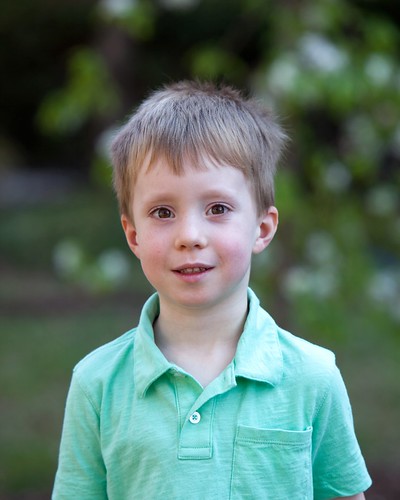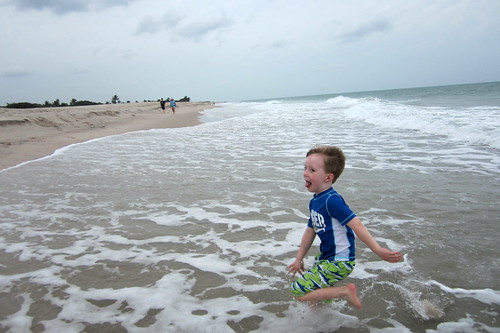Evan has recently become aware of Earth's orbit around the Sun. His questions about it are good ones: "Why do we have to go around it? Why is it so big? So we are little? How could anything be that big? What if we touched it? It would burn us and we would die?" And when I told him he has gone around the sun fewer than five times, he said "I think it's more than that."

I doubt it's part of the pre-K curriculum to make children feel small or to grapple with how much of their lives are determined by forces far beyond their control. Evan’s broadening awareness of his place in our family and in the universe are driven by his own curiosity. But I’ve found my conversations with him have been especially meaningful lately, because Evan's questions and attitude are a good fit for how I've felt for most of the past year and few months.
I know, logically, that there are things over which I have no control. But emotionally, it’s exhausting to face the reality that my favorite person on Earth was sick, and there was little substantively I could do about it. In that grappling for traction against the fear I felt at Allison’s early diagnosis, I was reminded constantly of the mechanism we wield best against the reality of being pulled by orbits much larger than our own: kindness.
On the day we received the news of Allison’s diagnosis, I felt as small as I’ve ever felt. It was a Friday. I was still at work. Allison called and gave me the news while I was supposed to be supervising the first meeting of the Harry Potter Fan Club at my school. After I hung up, I moved from feeling numb to crying uncontrollably. Within minutes, my friends Angie and Mary were packing my belongings, attending to the Hogwarts faithful, and whisking me out the door with hugs and promises of support. They, and many others at work, made it clear that my energy was needed elsewhere.
Over the next week, as we received more information about Allison’s cancer and began to trace a plan for treatment, family rallied to us. In person, in word, and in deed, family and friends rearranged their lives and obligations to buoy us. Even though no one could answer the big, impossible questions I was wrestling, we didn’t feel alone. I felt loved, and the means people used to share that love was kindness. Love can be an abstraction sometimes--a thought that we keep to ourselves, or a feeling about another. Kindness isn’t passive; kindness finds its meaning in action and expression. It’s informed by love, and motivated by compassion. But the key is in its action.
I had to go back to work. I didn’t know how to explain what was going on to my students. I composed a clumsy blog post and braced myself for returning to work and carrying on.
High school students get a bad rap. It’s in their nature to be self-centered and inward-looking. After all, they’re discovering who they are as independent entities and realizing the power and potential they have in their own lives. I was prepared for critical notes from the substitute teachers who had fumbled their way through the uncertainty of the time I was out.
I didn’t know what to say, but knew I wanted to say something, so I decided to sit and talk with my classes. My first class went silent as soon as the first bell rang. It is impossibly eerie to sit in front of a room of 16 and 17-year-olds who are completely silent of their own volition. I don’t remember what I said to them, but I remember asking them not to be silent, and that what I wanted was for them to be “normal,” a word I was struggling to define for myself at the time. I discovered what I should have known--that “normal” teenagers possess the same innate capacity for kindness we all do.
Students and former students gave me handwritten cards, sent me emails of support and well-wishes, sent me kind messages through Facebook, and expressed their concern and care in person. One student gave me a copy of her Calvin and Hobbes book to let Tobin read because it had brought her comfort before. Many more (more than I can count--and more than I could have imagined before) shared their own families’ experiences with cancer and fear and loss and sadness.
One student, with whom I hadn’t had the best classroom experience, sought me out after school one afternoon. He said “Hey Mr. Smith, I heard about your wife. I’m real sorry. I heard once that weed helps cancer, and I just want you to know that I can get some for y’all if you want, and I won’t tell anyone.”
On March 12, 2013, less than a month after Allison’s diagnosis, students and staff at the school organized a day to wear pink in honor of all the people in the school affected by cancer. Over three quarters of the staff and two thirds of my students wore pink. I felt humbled and small and undeserving, and I both wished Allison could be there to see everyone and that none of us had to see or feel such things.
This kind of paradox--being moved by something I’d prefer never to have experienced--is eased best by kindness in action. I used to be saddened that it seemed to take disasters and tragedy to tap what’s best in people. Why would that be? Why couldn’t kindness be our default behavior instead? I think now that it’s because those are the times when we’re made most aware of what we can and can’t control. The illusion of control is comforting, but it’s still only an illusion. And whether our displays of kindness are flying hundreds of miles to stay with an ailing loved one, or making a meal for a family, or expressing empathy and love through words, or even (and somewhat hilariously-beautifully-awkwardly-sincerely) offering a bag of weed, kindness is powerful and binding--a reminder of our best selves at the most important times.
So, like Evan, I’m reminded every time I learn something that there are myriad more things I don’t know. And like Evan’s, some of the questions I ask are unsettling and scary. And while I can’t promise him or anyone in my life whom I love or care for that “everything’s going to be ok,” I’ve been reminded over the last year of something I thought I knew before.
Over the last 5 years, I’ve rediscovered a love for the stoics. If you’ve had a lengthy conversation with me over almost any span during that time, you probably know that. A quote I like to share with new teachers we hire, or friends of mine who find themselves in such conversations with me, is from The Essential Marcus Aurelius, translated by Needleman and Piazza. I read it this year with a new appreciation for its power:
If you can, teach others to become better. If you cannot, then remember that the power to be kind has been given to you for this purpose. Even the gods care for such people and help them to gain health, wealth, and reputation, so helpful are they. Such kindness is also in your power, or tell me, who is there to prevent you?

2 comments:
Thanks for sharing.
1. With parents like you and Allison, I wouldn't expect anything other than kindness (and pure awesomeness) of your children.
2. The offer of weed was so genuine, thanks for seeing it for what it was, you might be the only person in that kid's life that would recognize his intentions.
We Torgs are thinking of you all everyday. I appreciate this post as an encouragement to myself as a teacher, a father, and a husband. Thank you Matt!
Post a Comment